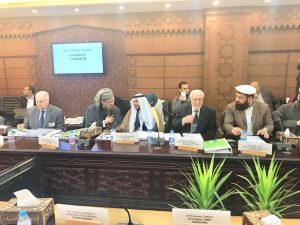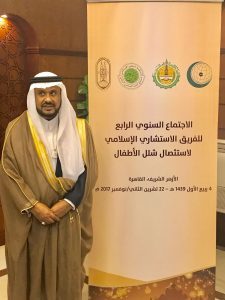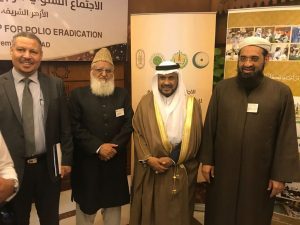 International Islamic University, Islamabad (IIUI) President, in his address to the Islamic Advisory Group for Polio Eradication (IAG) in Al-Azhar has called upon the universities of Muslim world to play role in polio eradication.
International Islamic University, Islamabad (IIUI) President, in his address to the Islamic Advisory Group for Polio Eradication (IAG) in Al-Azhar has called upon the universities of Muslim world to play role in polio eradication.
Speaking in the group’s fourth annual meeting that convened at the headquarters of Al Azhar Al Sharif hosted by Grand Imam Dr Ahmed El-Tayyib, Dr. Al-Draiweesh hailed IAG saying that the group has doubled the pace of achieving its objectives.
IIUI President said that polio eradication efforts have been hindered in some areas of Muslim countries due to misperceptions and realizing the situation IIUI expedited the efforts and gathered all the relevant organizations to discuss the awareness against polio and to curb the misconceptions in terms of vaccination. He told IIUI organized meetings of National Islamic Advisory Group (NIAG) which agreed to support final push for eradication of polio.
 Dr. Al-Draiweesh also told that IIUI’s Dawah Academy published fatwas of all schools of thoughts in the favor of polio vaccination. He furthered that IIUI, through its constituent units such as Dawah, Iqbal Institute for Research and Dialogue, has launched orientation courses for the prayer leaders and Muftis, where they were educated about diminishing the misconception prevailing against polio vaccination. Dr. Al-Draiweesh said that prevention from polio is the fundamental right of every children and IIUI recently organized a conference on the rights of children, where important recommendations were acquired after a discussion of dozens of experts, academicians and diplomats.
Dr. Al-Draiweesh also told that IIUI’s Dawah Academy published fatwas of all schools of thoughts in the favor of polio vaccination. He furthered that IIUI, through its constituent units such as Dawah, Iqbal Institute for Research and Dialogue, has launched orientation courses for the prayer leaders and Muftis, where they were educated about diminishing the misconception prevailing against polio vaccination. Dr. Al-Draiweesh said that prevention from polio is the fundamental right of every children and IIUI recently organized a conference on the rights of children, where important recommendations were acquired after a discussion of dozens of experts, academicians and diplomats.
IIUI President also hailed the role of Pakistani Islamic scholars and pointed out those who were also attending the meeting saying that it was an omen of there seriousness towards the issue. He was also accompanied by Director General Dawah, Dr. Sohail Hassan.
Earlier, IAG launched a new training manual for students of religious studies in support of polio eradication efforts. The manual provides practical guidance on how to engage with local communities to advocate for vaccination as well as other maternal and child health issues.
The Grand Imam expressed his happiness to see the progress achieved to eradicate polio in a satisfactory and reassuring manner, saying, ‘As Muslims we shouldn’t still be discussing a subject that has already been settled a long time ago.’ He asserted Al Azhar Al Sharif’s continued support and announced that the Publishing and Translation Department of Al Azhar will translate the training manual into 20 languages. They also recognized the remarkable leadership provided by the Governments of Afghanistan and Pakistan and the commitment of their fellow OIC Member States in maintaining adequate support. Dr Shawky Allam, the Grand Mufti of Egypt, also commended the contribution of the IAG to polio eradication efforts by addressing religious-based refusals on the ground.
 Hatem El-Khodary delivered the address of WHO Acting Regional Director for the Eastern Mediterranean, Dr Jaouad Mahjour, in which he commended the work of the IAG and its national affiliates in Afghanistan and Pakistan in supporting the efforts of the national governments and their implementing partners.
Hatem El-Khodary delivered the address of WHO Acting Regional Director for the Eastern Mediterranean, Dr Jaouad Mahjour, in which he commended the work of the IAG and its national affiliates in Afghanistan and Pakistan in supporting the efforts of the national governments and their implementing partners.
‘Islam strongly advocates the preservation and protection of children’s health and well-being,’ he said.
‘Countless prominent Islamic scholars, including those gathered under the IAG banner, have repeatedly confirmed this and have urged Muslim parents and influencers to ensure the immunization of all children.’
Dr Abdelqahir Qamar, Director of the Fatwa Department at the Jeddah-based International Islamic Fiqh Academy (IIFA), affirmed that the work of the IAG to protect the lives of children follows what Islam commands its followers. The launch of the training manual follows IAG’s efforts to prepare students of religious studies at key universities in predominantly Muslim countries to act as advocates for critical health initiatives particularly in high-risk areas where marginalized and undeserved populations reside.

